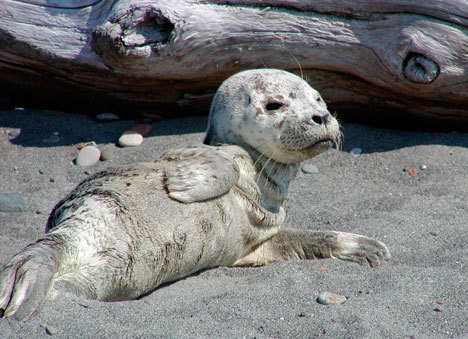If you find a harbor seal pup on the beach, keep your distance. You may save its life, and protect yourself from disease or injury.
“We realize they’re cute, but people really, really need to listen to us and stay away,” Susan Berta of Greenbank, a member of the Central Puget Sound Marine Mammal Stranding Network, said Thursday.
“It’s been a really tough season for human interaction,” Berta added. “I don’t know if it’s more pups or more people on the beach because of the warm weather.”
Harbor seal pups are born in the spring and summer and are nursed by their mothers for four to six weeks before being left to make it on their own, Berta said.
During that period, a pup may be left several times to warm itself on the beach while its mother goes off to search for food, sometimes for as long as 48 hours.
That’s when curious people show up, often with unintentionally damaging results that can lead to abandonment of the pup and even death.
Some examples:
For the past week and a half, a seal pup found on the beach at Holmes Harbor had been petted, fed and sprinkled with water, Berta said.
The pup became so used to people that it would come up to them looking for food, and followed them around. There has been no sign of the pup’s mother. On Thursday, the pup died.
In Oak Harbor, a woman recently found a seal pup on a beach. She took it home and put it in her bathtub. Calling around for advice, she reached Berta, who advised her to take it back where she found it.
Although the pup was away from the beach for no more than two hours, it died soon after its return, Berta said.
“It was definitely the wrong thing to do,” she said.
Meanwhile, another pup at Mutiny Bay was being fed by people for two or three days, until it died on Thursday, Berta said.
“The results usually aren’t good for pups if you get too close,” she said.
Only about half the pups born will survive their first year, Berta said.
Besides human interaction, seal pups die from premature birth, predators and dogs, infection, disease, dehydration and starvation due to abandonment by their mothers, Berta said.
“A nursing pup separated from its mother won’t survive,” Berta said, adding that mothers tend to stay away when there’s a disturbance around their pups.
“The pups that die on the beach become food for eagles,” she said.
She said another discouraging statistic is that seals that have become accustomed to being around humans often tend to be the ones that turn up shot to death.
“They’re not afraid, and all of a sudden they’re not so cute,” Berta said. “They’re a nuisance.”
Approaching and touching a seal pup on the beach is a violation of the federal Marine Mammal Protection Act.
Violators could be subject to as much as a $10,000 fine per incident from the National Oceanic and Atmospheric Administration, Berta said.
Officials recommend that you stay at least 100 yards from the pups, and view them with binoculars if you want a closer look.
Keeping an appropriate distance may be good for you, too.
Seal pups often carry diseases that may be harmful to humans, and can cause injury to people who try to approach them, Berta said.
She said the overall seal population, from the San Juan Islands into Puget Sound, remains heathy, and continues to increase.
She said an estimated 15,000 harbor seals are in the region, and 4,000 pups a year are being born, half of which survive.
“But when humans get involved, it causes problems,” Berta said. “Even if they become used to humans, it’s still a natural stressor for them.”
If you find a seal pup on the beach in Island or Skagit counties, or north Snohomish County, call the Central Puget Sound Marine Mammal Stranding Network at 866-ORCANET or 360-678-3765. For pups found in other areas, call the National Marine Fisheries Service 800-853-1964 or 206-526-6733.



